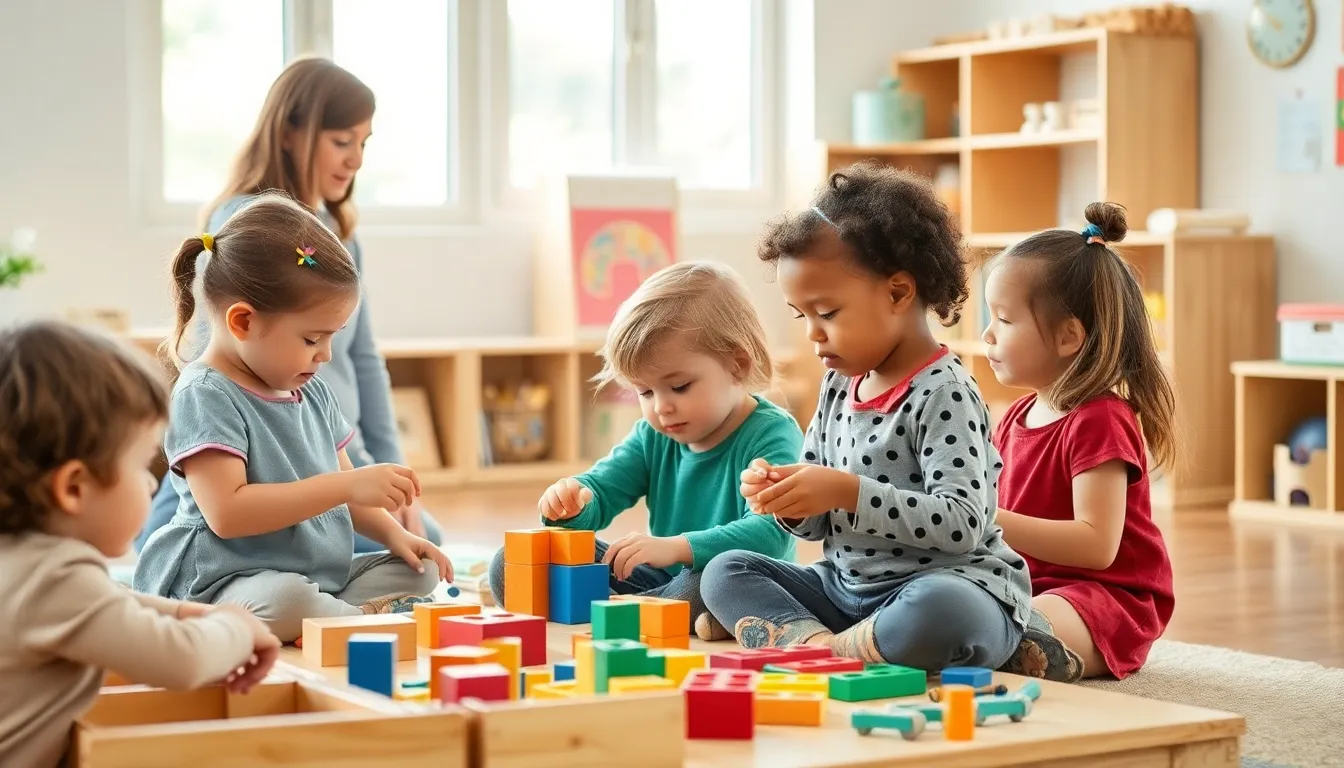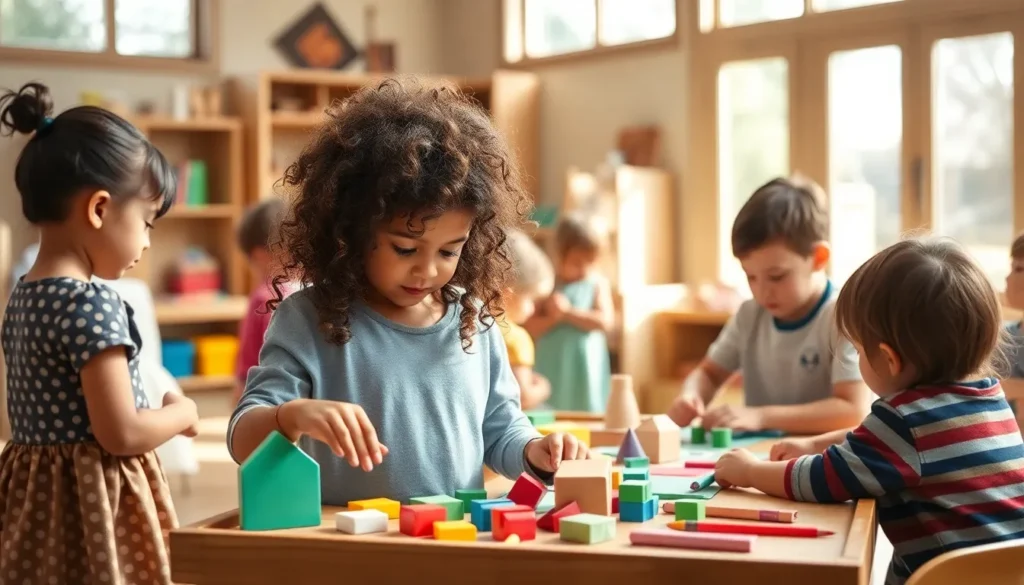In a world where traditional education often feels like a game of “sit still and listen,” the Montessori method bursts onto the scene like a confetti cannon at a stuffy board meeting. It’s not just about crayons and finger paints; it’s about empowering kids to take the reins of their own learning. Imagine a classroom where curiosity reigns supreme and children are encouraged to explore, create, and even make a mess—yes, messes are allowed!
Table of Contents
ToggleOverview of Montessori Education
Montessori education emphasizes self-directed learning, allowing children to explore at their own pace. It creates an environment where children feel free to ask questions and seek answers. Educators act as guides, facilitating experiences rather than directing them. This method encourages independence, fostering critical thinking and problem-solving skills.
In the Montessori classroom, materials are carefully designed to facilitate hands-on learning. Real-world objects engage children and promote sensory experiences. Specific activities strengthen fine motor skills and cognitive development through exploration. The learning environment is structured yet flexible, adapting to each child’s unique learning style.
Collaboration thrives in Montessori settings. Children work together, sharing knowledge and ideas. This promotes social skills and enhances communication abilities. Peer learning occurs often, allowing older students to teach younger ones, reinforcing concepts for both.
The Montessori approach values respect for each child as an individual. Children’s interests dictate lesson plans, making learning relevant and engaging. Lessons encompass a wide range of subjects, integrating various disciplines seamlessly. Education extends beyond academics, nurturing emotional and social growth.
Assessment in Montessori education differs significantly from traditional methods. Observations are key, guiding educators in their understanding of each child’s progress. Standardized tests are not central to evaluating learning; instead, personal development takes priority.
Overall, Montessori education cultivates well-rounded individuals. Through fostering independence, collaboration, and respect, it prepares children for lifelong learning. This method aligns with developmental needs and encourages curiosity, essential for future success.
Key Principles of Montessori

Montessori education revolves around specific principles that enhance a child’s learning experience. These principles prioritize individual growth and development in a supportive environment.
Child-Centered Learning
Child-centered learning forms the heart of Montessori philosophy. It allows children to pursue their interests at their own pace, promoting engagement and intrinsic motivation. In these settings, each child explores concepts tailored to their curiosity, fostering ownership of their educational journey. Opportunities for hands-on activities enable children to connect theoretical knowledge to real-world experiences. Exploration and discovery occur naturally as children choose their paths in learning. This process encourages active problem-solving and critical thinking abilities.
Role of the Educator
The educator’s role in Montessori education differs significantly from traditional teaching methods. Educators serve as guides, facilitating exploration rather than dictating lessons. They observe, assess interests, and provide resources to support child-led learning. Effective educators create enriching environments filled with engaging materials that spark curiosity. They promote collaboration by encouraging children to work together and share ideas. This approach nurtures confident learners who develop self-discipline. By respecting individual learning styles, educators help children thrive both academically and socially.
Montessori Influence on Cognitive Development
Montessori education significantly influences cognitive development through various approaches. It nurtures critical thinking skills and enhances problem-solving abilities, creating well-rounded individuals.
Critical Thinking Skills
In Montessori classrooms, children engage with materials that promote exploration and inquiry. They learn to analyze situations and gather information independently, allowing them to draw conclusions based on evidence. This method encourages open-ended questions, prompting children to think deeply about concepts. Group discussions further enhance critical thinking, enabling children to articulate their thoughts and listen to diverse perspectives. Educators facilitate this process by guiding discussions without dictating outcomes. As a result, children develop strong critical thinking skills that extend beyond academics into real-world applications.
Problem-Solving Abilities
Children in Montessori environments face challenges that encourage creative solutions. Hands-on activities often require them to experiment with different strategies, fostering flexibility in their approach to problems. Collaboration with peers frequently leads to shared insights that enrich their problem-solving experiences. Educators support this journey by providing thoughtful feedback, promoting a growth mindset. Acceptance of mistakes as learning opportunities reinforces resilience and determination. Through these practices, children cultivate robust problem-solving abilities essential for their future endeavors.
Montessori Influence on Social Skills
Montessori education significantly enhances children’s social skills through various key practices.
Collaboration and Cooperation
Children thrive in environments that emphasize collaboration and cooperation. In Montessori classrooms, they often engage in group activities that require teamwork. Older students frequently mentor younger ones, promoting shared knowledge and reinforcing concepts. This peer-to-peer learning fosters a sense of community and belonging. Educators encourage children to work together, solving problems collectively and building effective communication skills. Experiential learning activities, such as group projects, teach children to navigate differences and appreciate varying perspectives. Through these interactions, they gain essential social competencies that carry into adulthood.
Respect for Others
Respect for others is a foundational principle in Montessori education. Children learn to value each individual’s uniqueness, embracing diversity within their community. Classrooms cultivate an atmosphere of mutual respect, where children express their opinions openly and listen actively. Educators model respectful behaviors, guiding children in understanding the importance of empathy and kindness. By encouraging children to share resources and ideas, they develop an appreciation for collaboration over competition. Conflict resolution strategies also come into play, helping children address disagreements positively. These experiences instill lasting respect for others, crucial for forming strong interpersonal relationships.
Montessori Influence on Emotional Growth
Montessori education significantly impacts children’s emotional growth by fostering essential skills in independence and emotional regulation.
Independence and Confidence
Children engage with a variety of materials designed to support self-directed learning. This engagement allows them to make choices, fostering a sense of autonomy. When children take ownership of their activities, they build confidence in their abilities. Experiencing success in tasks, like completing a puzzle or growing a plant, further enhances their self-esteem. Independence in learning naturally translates to confidence in other areas, encouraging children to tackle challenges with a positive mindset. Furthermore, as they develop self-management skills, children learn to trust their judgment and capabilities, laying a foundation for lifelong independence.
Emotional Regulation
Emotional regulation finds a central role in Montessori education, as children are often encouraged to express their feelings. Classroom activities promote awareness of emotions, guiding children to identify and articulate their feelings. Learning through cooperative play allows them to practice empathy and recognize others’ emotions. Moreover, educators model strategies for managing feelings, such as deep breathing or conflict resolution techniques. By addressing emotions constructively, children learn the importance of patience and resilience. These experiences cultivate emotional intelligence and equip children with tools to navigate social interactions more effectively, preparing them for future emotional challenges.
The Montessori method profoundly shapes children’s development by nurturing their independence and creativity. By fostering an environment that promotes exploration and collaboration, it empowers children to become active participants in their learning journey. This approach not only enhances cognitive skills but also builds essential social and emotional competencies.
As children engage with hands-on materials and learn from one another, they develop critical thinking and problem-solving abilities that will serve them well throughout life. The respect for individuality and emphasis on personal growth within Montessori education creates a solid foundation for lifelong learning. Ultimately, the influence of Montessori extends beyond the classroom, preparing children to navigate the complexities of the world with confidence and resilience.






